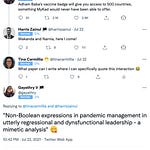This week…
We are reminded about how we normalise omitting fact-checks and verifications especially when it comes to feel-good stories:


And for our interview segment, I speak with tech and lifestyle-focused content creator Emmanuel Olalere as he mulls over online privacy and digital wills, and describes how the MySejahtera app is symbolic of Malaysia’s current sociopolitics, the same way Nigeria’s Ghana Must Go bag is symbolic of the country’s descent into dysfunction in the 80s. You can find the full transcript at the link below.
But first, a selection of top stories on my radar, a few personal recommendations, and the chart of the week.
Whose democracy counts when global social media rules are set?
“What works for the United States may not work elsewhere,” writes Heidi Tworek for CIGI:
Instead of talking about democracy as an abstract, ill-defined ideal, we can examine different definitions of democracy and consider the role of social media in each. By breaking down the components of democracy, we can piece together a more complete picture of how platform governance might address each issue. Perhaps even more crucially, we can follow a global thread to see how solutions that might seem to work in one democracy may prove harmful or extremely complicated in another.
How Reddit turned its millions of users into a content moderation army
Joel Khalil on Reddit’s multi-layered self-policing approach, for TechRadar:
Unlike Facebook, for example, which outsources much of the work to moderation farms, Reddit relies in large part on its communities (or subreddits) to self-police. The efforts of volunteer moderators are guided by rules defined by each individual subreddit, but also a set of values authored and enforced by Reddit itself.
Twitter hired biggest tech critics to build ethical AI
Anna Kramer on Twitter’s recent hiring spree of ethical AI superstars, for Protocol:
These hires are a massive coup for a social media platform desperate to escape the waves of vitriol and criticism enveloping Google and Facebook’s work around algorithms, machine learning and artificial intelligence. While Google was forcing out prominent AI ethicists and researchers Timnit Gebru and Margaret Mitchell and Facebook was trying and failing to persuade politicians and researchers that it did not have the power to manipulate the way algorithms amplified misinformation, Twitter was giving [Ari] Font and Jutta Williams … the resources and leeway to hire a team of people who could actually act on Twitter’s promise to listen to its researchers.
And they all happen to be women—though, we are not surprised (John Naughton, The Guardian).
What I read, watch and listen to…
I’m reading The Making of a Perfect Celebrity Apology by Hunter Harris for Vice.
I’m watching Al-Jazeera’s piece on deepfakes, by Sandra Gathmann.
I’m making a temperature sensor to alert me when it’s too cold for my tropical plants to stay outside.
Chart of the week
The Global Disinformation Index looked at U.S. readers’ perception of a news outlets disinformation risks, which was released in a report this month:












